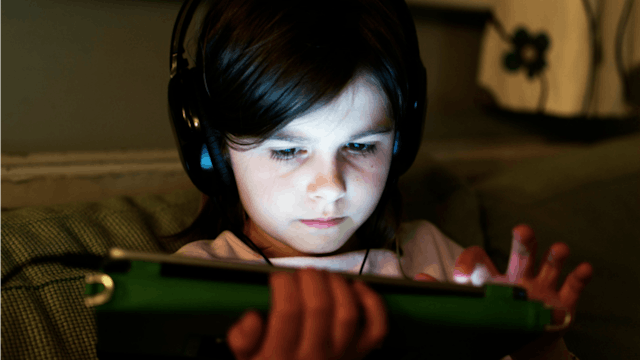This Simple Trick Can Help Tweens And Teens Sleep Better At Night

Recently, my both my kids had some sort of sleep regression – i.e., they basically decided that sleeping was totally out of style, and that it was better to stay up all night and drive their parents batshit bonkers. Maybe it was the fact that they were adjusting to the shorter, less active days of winter, or maybe it was because they were just coming off of winter break, and their bodies were having trouble adjusting.
Whatever it was, it freaking sucked and I was desperate to get them to fall the eff the sleep.
So I started doing some research into better ways of winding my kids down for sleep. I know all about good regular bedtimes, and calming routines; we’ve been doing that for years. We’ve even tried meditation and weighted blankets. But there was one aspect to all this that I hadn’t really considered: nighttime screen time.
Ughhh. As much as I know I shouldn’t, I let my kids unwind in front of the iPad or computer before bedtime. It seems to relax them, and it’s a good way for me to finish up my evening routines. We spend a good deal of time reading and cuddling after that, but according to experts, screen time within an hour before bedtime is a big no-no.
Part of this has to do with the fact that screens emit something called “blue light,” which can slow or halt your body’s natural ability to release melatonin, a hormone that you produce in the evening and that makes you feel relaxed and sleepy. In other words, messing with melatonin means that you are more likely to be wakeful at night, and it will be harder for you to drift off to sleep.
Well, shit. How could I have been a parent all these years without knowing this? (OK, it’s possible I read this somewhere but didn’t want it to be true, because – let’s be honest – it’s much harder to parent without a screen break during the evening hours.)
My tween was actually the one to alert me to this phenomenon. And techie junkie that he is, he told me there is actually a way around the whole blue light/melatonin issue — you can use an orange/red filter on your device to mitigate the effects of the blue light. Yay!
In fact, any Apple product that’s iOS 9.3 or newer has a built-in filter for this (again, how on earth did I not know this?). When I heard this, I went and tried it myself. It was easy peasy. You can go to “Settings” on your device, select “Display & Brightness,” and click on “Night Shift.” From there, you can customize the “color temperature” of your screen, and even pick the hours of the day you want your phone to shift into the filter.
Here’s my “Night Shift” settings screen:
Wendy Wisner
My son, who spends a lot of time on his computer before bed (doing homework, but also — sigh – playing video games) found an app that he could install on his computer that has similar results and features as the one on my iPhone (just do a Google search for “blue light filters for computers” and you’ll get a ton of results). Many computers already have a built-in filter, so you can look for that too.
There are similar filters for Android devices and tablets. And get this: there are also blue-light filtering glasses/googles you can wear that serve the same purpose. I mean, they’re not exactly fashionable. But hey, they get the job done.
Image via Amazon
Of course, all this being said, there are other good reasons not to spend oodles of times on screens before bed. Let’s face it, not everything our kids watch is exactly relaxing or sleep-inducing. And studies show that even if blue-light filtering products can help somewhat, they are not a cure-all, and limiting times on screens before bed is still important.
Still, who am I kidding? It would be pretty hard to break the before-bedtime screen habit – for my kids, or for me. Seriously, after a long day caring for kids, you can try to pry my iPhone out of my exhausted, desperate hands.
As for whether this whole thing is helping us sleep, my answer is yes – or at least I think so. The “sleep regression” thing seems to be solved, and my kids are going to sleep fairly easily lately (knock on every piece of wood in the universe). It could certainly be the fancy screen filters we’re using, or it would very well be the fact that they’re tired AF after not having slept for a week.
Either way, filtering our devices is easy, and there’s science to back up the notion that it’s better for our sleep. Win-win!
Now excuse me while I stay up half the night scrolling through Facebook while I should be sleeping…